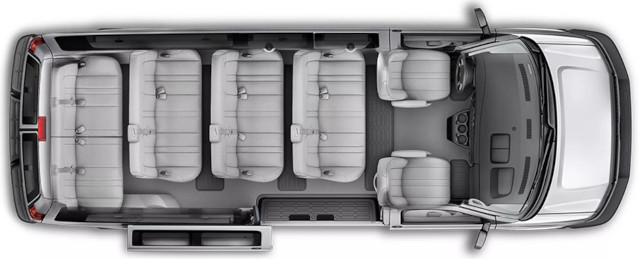 Question: I would like to use a 15 Passenger Van for a pleasure use trip and am wondering if a class 5 license is valid for this use? I have read CCMTA guidelines for the use of 15-Passenger Vans and it seems that for pleasure use a class 5 license is valid. But I'd like to confirm.
Question: I would like to use a 15 Passenger Van for a pleasure use trip and am wondering if a class 5 license is valid for this use? I have read CCMTA guidelines for the use of 15-Passenger Vans and it seems that for pleasure use a class 5 license is valid. But I'd like to confirm.
A 15 Passenger Van is a Bus
In general, a class 5 driver's licence does not permit the operation of a bus. Here is the definition of bus, and you can see that a 15 passenger van may fit the definition, depending on how it is used:
"bus" means a motor vehicle having a seating capacity of more than 10 persons, including the driver, that is operated for hire or for public transportation;

Public Transportation is defined as:
"public transportation" means the transportation of a group of persons other than family members or associates;
Definitions and Interpretation
30.01 (1) In this Division:
(2) The classes of driver's licences and the categories of motor vehicles that the holders of each class of licence are permitted to drive are as follows:
(c) Class 7 licence, subject to the applicable conditions and restrictions under sections 30.072, 30.10 (4) and 30.11 (1), permits operation of
(i) a 2 axle motor vehicle other than a motorcycle, but does not include a bus, school bus, special activity bus, special vehicle, taxi or ambulance, when used for its purpose as intended by design,
(ii) a 2 axle motor vehicle or 2 axle tow car with towed vehicles if the towed vehicles in that combination do not exceed 4 600 kg,
(iii) a motor home or motor home with towed vehicles if the towed vehicles in that combination do not exceed 4 600 kg,
(iv) a limited speed motorcycle, all terrain vehicle, all terrain cycle or utility vehicle,
(v) a construction vehicle, or
(vi) despite subparagraph (i), a school bus that
(A) is a passenger vehicle as defined in section 11.01 (1), and
(B) has a seating capacity of not more than 10 passengers including the driver;
(g) Class 5 licence permits
(i) operation of a motor vehicle or combination of vehicles for which a Class 7 licence is required, and
(ii) if permitted on the licence, operation of a combination of vehicles referred to in paragraph (c) (ii) or (iii) that are without air brakes even if the towed vehicles in that combination exceed 4 600 kg;
So, if someone pays to ride in the van, or the van is used to transport a group that is not a family or friends (eg: a hockey team), then a class 5 or 7 licence is not sufficient.
ICBC is the issuer of driver's licences for British Columbia.
Here is their information on licence classes and types.
- Log in to post comments
One way of looking at things is this - parents of a large family (a dozen kids, maybe) might find that this type of vehicle would provide their best personal transportation option. And there's no reason why them there parents couldn't take their whole family out shopping, or for a meal, in that vehicle.
But, they can't take any sort of organized group size (regardless of whether they're paid for this, or merely volunteering) such as a school team without having the appropriate (Class 1, 2 or 4 Unresticted) license.
- Log in to post comments
Circa 2007, can't remember the name, but he got majorly screwed by ICBC after getting into an accident with Class 5 in a 15P with some friends:
- Called ICBC to find out if he could use his Class 5 license for non-commercial friendly family get together for excursions to the interior before buying the van.
- Was told that noncommercial use is fine...
- Got into an at fault accident and some passengers got injured
- ICBC refused to provide any liability coverage because "wrong class"
- Ended up owing several hundred thousand dollars to ICBC for paid-out 3rd party injury claims
I think he probably had to go through bankruptcy, after unsuccessfully fighting it with lawyers and such.
- Log in to post comments
I would want more information - and to know more about that non-commercial friendly family get together vs travelling as an organized group; because that's what the liability/driver license issue would be dependent on.
2007 was the same year that this crash happened between Abbotsford and Chilliwack, where an eighteen-year old girl on a Class 5 license was found responsible (though there were several factors, if you read through the latter article). I recall receiving phone calls from two different colleagues - ICBC Regional Licensing Manager Blair Grant, and RCMP Traffic Sergeant Bob Beaudoin - the day it happened, to exchange points of view and information on the licensing issues involved.
Subsequently (probably consequently, too) the Passenger Transportation Authority operating rules were changed and I think the definitions for licensing as well.
When one of these vehicles is involved in a crash, it's usually messy with injury or death of some occupants not uncommon. But when Transport Canada investigated, they determined that the vehicles are not inherently dangerous.
- Log in to post comments
Phew, that was a lot of effort to dig up - I couldn't recall the guy's name at all.
The incident actually happened in 2001, but the appeals stretched up to 2010.
Guy definitely got screwed. But he was self-representing, so its kind of a lost cause to begin with.
Should've went with Doroshenko, but I'm not sure if he was around back then, but it doesn't seem like the guy had much money, considering he had just purchased a brand new 15P, had it burn down, and no insurance coverage. Probably had to keep making car payments too.
- Log in to post comments
What an unfortunate case (though interesting to read through in the academic sense).
Mr Melnikov seems to have attempted to do his best to ensure he had adequate coverage, although the information he acted on (or failed to) was second-hand advisement from a private insurance agent only. That it took a 20-minute conversation that happenened out of his hearing and without written evidence of the agent's advice should perhaps have set off warning bells.
That said, ICBC meanwhile had an obligation as the insurer to make sure his claim was valid under licensing regulations. We rely on insurance companies that we pay premiums to for our own insurance to protect themselves from unjust claims in order to minimize these premiums.
As the owner/operator of a vehicle of this exact type, and it being licensed both as a Driver Training Vehicle and a Bus, some random but related things come to mind, in no particular order.
- Despite being the registered owner and prime operator of the vehicle and being entitled to maximum RoadStar discounts, I have to pay over $4,300 in premiums per year. More than three times what it would cost me, I'm guessing, if I only had it insured as a personal vehicle.
- Fire extinguishers. Mr Melnikov presumably didn't have one in the vehicle, and it's obvious that it would have been of great help. If his vehicle had been registered as a bus, it would have been subject to twice-annual Government Inspections that would have included ensuring that a properly charged and checked extinguisher was on board (along with a First Aid kit and Flags/Flares/Triangles or like that).
- Difficulty with exiting the vehicle - it was the worst possible scenario. A passenger-packed van, rolled onto it's right side. Can't open the right front door, can't open the side door to the passenger compartment, can't open the rear exit doors from the inside of the bus (because the rear bench seat blocks access to the inside door release handle) ... and meanwhile, the vehicle was on fire. Must have been hell.
- Poor driving skills, or he wouldn't have lost control of it on that gravel road.
Just because I have some knowledge and experience with ICBC and insurance issues acquired over the years in various capacities, and because it's easy for me as a North Vancouver resident, when I have an essential question about insurance coverage I don't even bother talking with an outside agent, I walk into ICBC Head Office and have a direct, documented discussion with a genuine ICBC advisor. Mind you, I still don't trust those folks, having been through a BI claim with them some years ago. Their tactics are despicable.
- Log in to post comments
What a nightmare, I had already forgotten all about this. It's outrageous! He acted on advice of ICBC basically from start to finish - from the day he bought the van to the day it bankrupted him.
- Log in to post comments
- Log in to post comments

ICBC on Driver's Licence Requirements